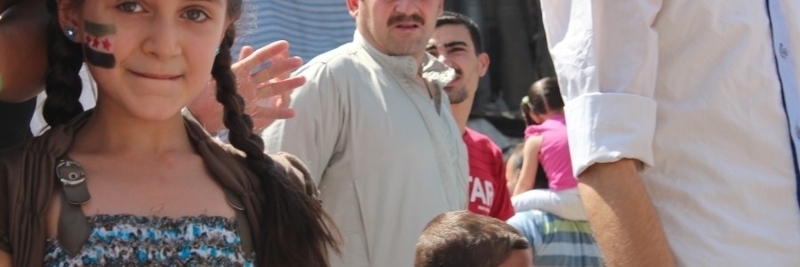Daily life in the city of Daraya has been full of chaos and death since the uprising began. It is no longer safe to walk around outside. But we were compelled to venture out onto the streets when my small daughter, barely a year old, became ill.
It had been a quiet day, relatively speaking, and we managed to get to the paediatrician’s. But as we left the clinic we saw a tank outside. It took only a few seconds for us to realize that the army had invaded the city.
As soon as we got into our car, the shells began to fall. The explosions and the screams of my terrified child filled our ears, but God kept us alive.
We fled to someone’s house to wait for the shelling to stop so that we would be able to return home. After a few hours, we were able to make our way back, although our house was no more secure than the streets outside.
The explosions came closer and closer, and I was shocked when my 3-year-old child asked if we could leave and spend the night at her grandfather’s house. She thought it would be safer there.
That night, a sniper’s bullet nearly hit her as she slept. She survived thanks only to the grace of God. Seconds afterwards, the explosions outside began to intensify, and within minutes a rocket landed right on the building.
We piled up mattresses in the apartment’s hallway to try and provide some shelter from the barrage of bombs and rockets falling outside. Shells pounded the building, and we huddled together in that tiny space, barely two meters wide, six adults trying to protect two small girls.
In those few minutes, I was sure we were going to die. With dust thick in the air and glass from the shattered windows flying all around, I could barely make out my children’s faces. All I could see were their frightened, expectant eyes.
Our voices rose in the shahada prayer. We felt that only God could preserve us. And most heartbreaking of all was the small voice I heard adding its prayers to ours as my 3-year-old repeated the words, “I bear witness that there is no God but God.”
At that moment, the terror truly overwhelmed me. Which of my daughters would I lose? Would only one survive, alone among the dead in an empty building? There would be no one to hear her screams.
I began thinking that a shell might land right on top of us and kill us all. I felt ashamed as I looked into my girls’ terrified eyes. In my head, I was weighing up their chances, as if I could somehow control where the shells would land. I thought that maybe I had placed one of them in a safer corner than the other. Which one would survive?
Suddenly there was a shocking silence. We heard calls from the neighboring building, “Come over to us, it’s safer here!”
We all made our way next door, taking shelter on the ground floor with a group of women and children. I took some bread and yogurt with me – I had no idea how much time we would spend there – and made my way to the kitchen, afraid that my girls might get hungry.
All the children in the shelter looked longingly at the bread, and gathered around the modest platter I set out. I felt an incredible pain for all my country’s children as well as my own.
I searched through the building we were in and found a little girl in one of the rooms, a child of four injured by shrapnel embedded in her small body.
Unlike the other children, she did not want to eat. The pain was stronger than her hunger.
I saw my own daughter in her, and stayed to try and ease some of her pain. Her mother had been wounded, too, and the child needed someone to reassure her. But her small body was weak. She closed her eyes and died, her soul ascending to heaven, God willing.
I cannot and will not forget that little girl who died. And I won’t forget the question my small daughter asked in her innocence during one of the rare moments of calm.
“Mama, why are they shelling us?”
I couldn’t find an adequate reply. Why are they shelling us?


